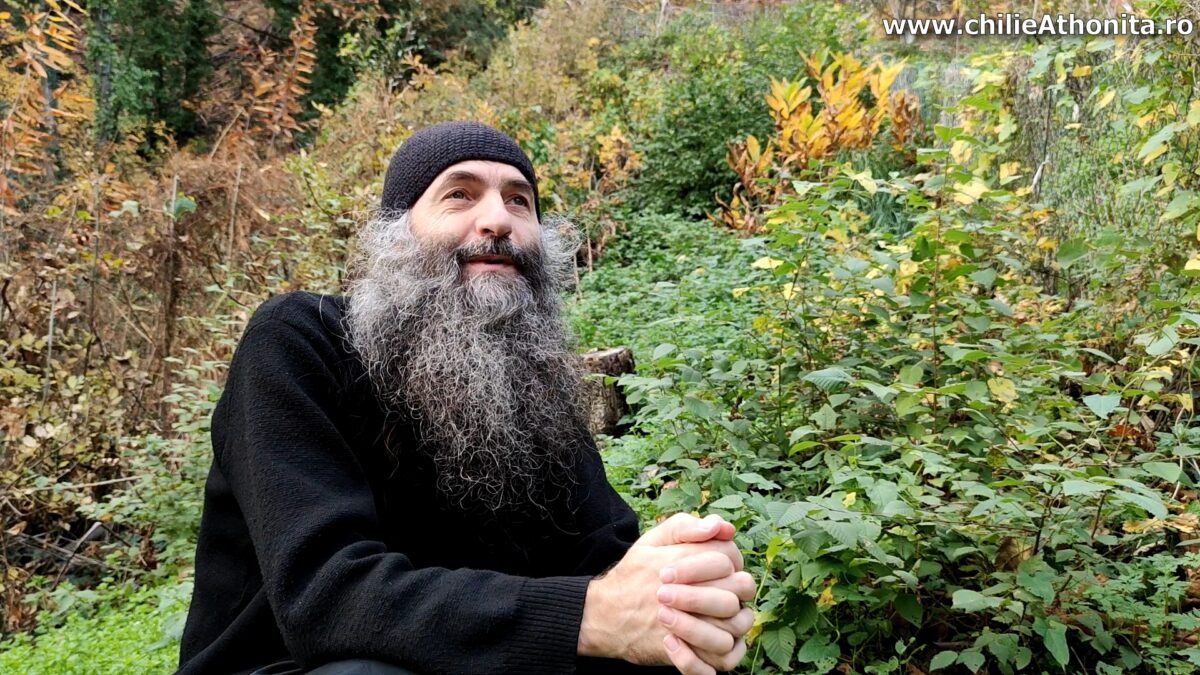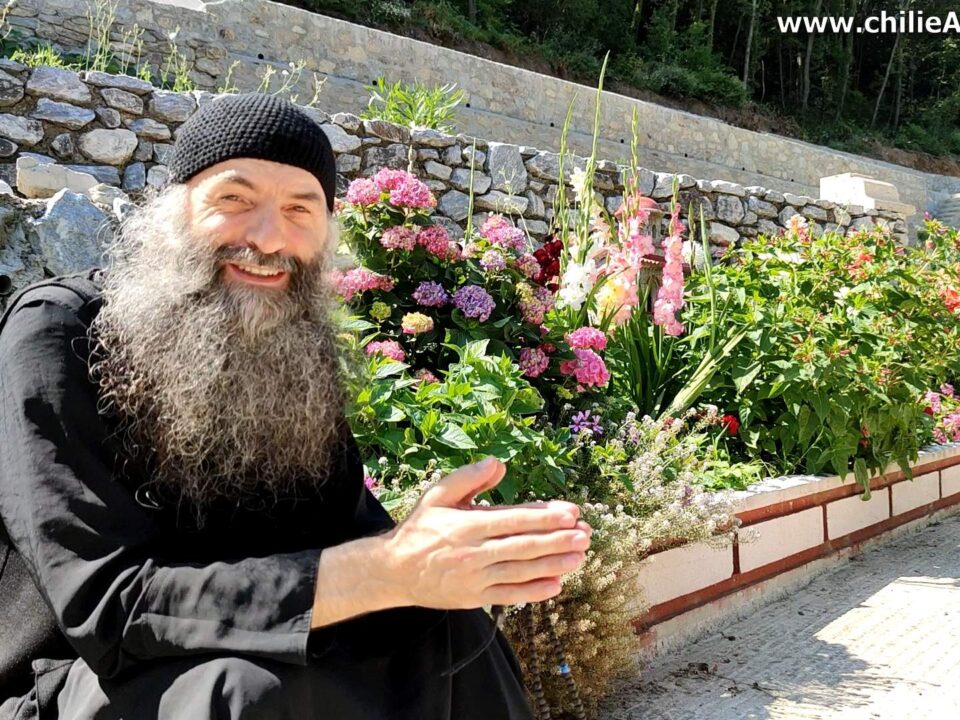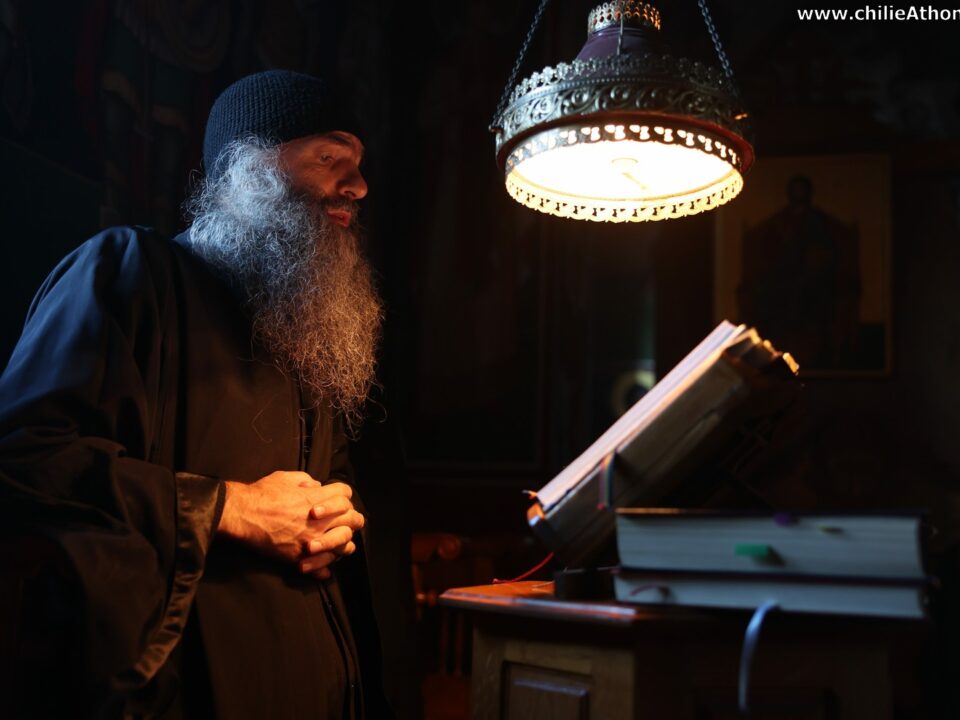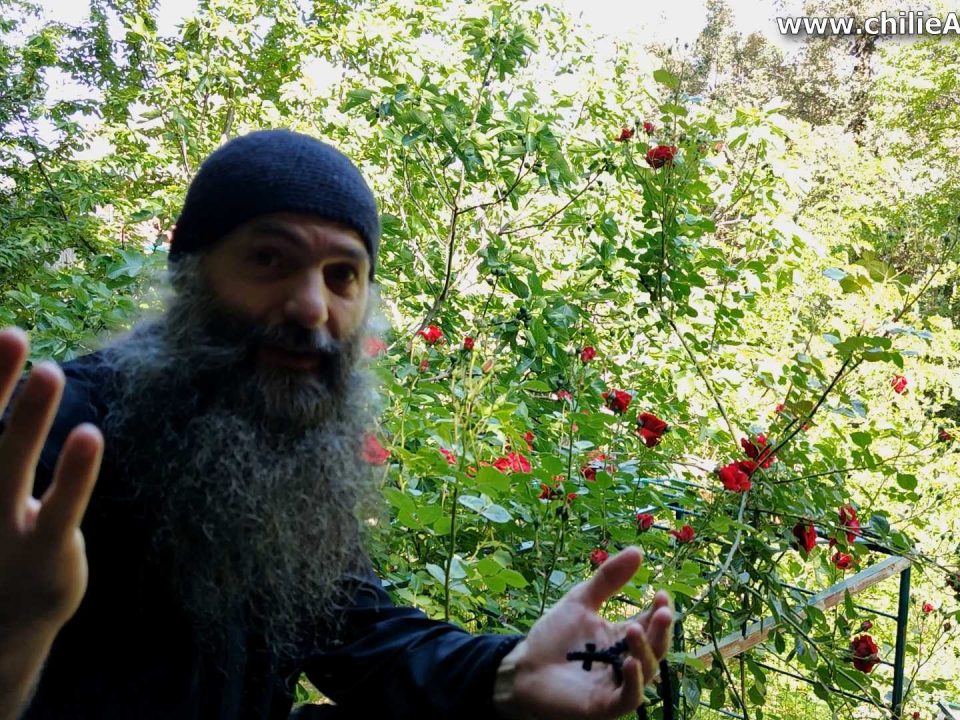
Meaning in Life, Languor – Father Theologos
13 December 2022
This Is How We Stop Evil!
18 December 2022An empress can become a saint? Yes, this can truly happen. To find out how, watch Father Pimen Vlad tell us about the wonderful life of Saint Theophanó.
Enjoy!
Here we are again, my dears! What to talk about now? We have always talked about many things, about many saints, especially lately. Have you seen that? We’ve talked about great saints, especially now, in December, this month, which is a preparation for the Nativity. What wonderful saints! Saint Sabbas the Sanctified, Saint John of Damascus, Saint Hierarch Nicholas, Holy Great Martyr Philothea, Saint Spyridon and many other wonderful saints. I’m going to try to tell you a few things about St. Theophano the Empress, whose celebration, I hope I recall that correctly, falls on the 18th of this month.
Who was Empress Theophano? How did she come to holiness? She was born in Constantinople to aristocratic parents. Her father was illustrious, that is, in a high office. His name was Constantine and her mother was Anna. They had a great pain: they had no children. They were very faithful, merciful, kind, but they had no children. They began [to say] prayers to the Mother of God, daily and nightly prayers to the Mother of God, to make them happy by giving them a child, at least one, if not more.
Years went by and they saw that this was always the case: families who had no children seemed to live life in vain, that in fact this is also the purpose of life, of the family, because otherwise people would not marry. As is the commandment: “Be fruitful and multiply, and the woman shall be saved by bearing sons!” It was a blessing from God to have children! And it is a blessing, even if others understand it differently in our times and it seems to them that it is a bit much as the population has grown. God can make Earth sustain about 20 billion more people.
The two prayed a lot to Our Lady until she blessed them with a daughter. They named her Theophano, raised her beautifully, carefully, in the Christian faith, permanently at church. She was very wise when it came to her education. So she was, as they say, adorned with all the gifts. At that time there was Emperor Basil of Macedon, a good, faithful, God-fearing emperor who had a son whom he named Leo (later given the name Leo the Wise).
When he reached an advanced age, the emperor said to himself: “I’ll have Leo marry and reign with me, learn from my experience, and become emperor afterwards.” And then he searched throughout the kingdom to find a girl who would be best suited for him, and he found Theophano, who really had all the gifts from God. Of course, the two liked each other and got married. [The emperor] made Leo the emperor alongside himself, and they reigned together.
But here, in the royal palaces, as always, there was some person who pretended to be a great Christian, had even acquired a position through the church, but who was a Manichaean regarding his faith and was a sorcerer, engaged in witchcraft. The emperor had another son, who died as a child, and the emperor was very saddened. The sorcerer, with his spells, brought the dead son in the form of imagination before the emperor. Somewhat comforted to have seen his son, the emperor believed the sorcerer to be a saint.
But Leon could not stand the sorcerer, because, being wise, he understood that he worked with guile, with all kinds of follies. The sorcerer, realizing that the younger emperor gave him neither honor nor respect (because he realized that he was dealing with unclean things) began to hate him and wished for his death, but he hid it.
The sorcerer was looking for an opportunity to behave nicely with the emperor’s son, and once, approaching him, said to him: “You often go hunting with your father in different places and you respect your father a lot. But I know that there are always people who wish him harm. That’s why it’s good to have a well-sharpened, 2-edged sword with you, beautifully hidden in your boot, so that if anything arises you can defend him. But let no one know it, let it be hidden there so you can defend him.” Leon took for granted what he said and took a small sword with himself to have in case of anything, besides what they had, such as hunting, bows, swords.
After that, the sorcerer caught a moment when the emperor was in a better mood and walked past him: “Your Majesty, I want to say something. You have to be very careful, something’s wrong! Your son is ready to kill you, to take over the whole kingdom, to rule alone. He has a sword ready in his boot, so that when you go hunting, he will find a moment when you two are alone and kill you. Search him and you’ll see it’s true!”
After some time, the son had become accustomed to having his sword with him, while hunting, the emperor stops when they are in the middle of the forest and says to the servants: “Search my son’s boot!” When they searched for him, they found the sword.
“Do you want to kill me?”
– No, that’s not what I have it for!
“I don’t want to see you anymore, I don’t want to hear from you anymore.”
Servants, take him and lock him in a tower! They took Leon and his wife, Theophano, and locked them in a dark tower, without light, like in a cave, with only bread and water, kept there totally isolated.
The sorcerer, satisfied that he had achieved his goal, continued to flatter the emperor, because he was not satisfied with one thing: what if all this was found out and the emperor’s son would be taken out of there? He had to get rid of him altogether.
“Your Majesty, do not let him live, or at least gouge out his eyes, so that he will never again yearn for the kingdom.
And he put this idea into the emperor’s head.
Two years passed, in that tower, in suffering, the two spouses clung completely to God. Being faithful, they prayed all day, lived like hermits in prison, only in prayer. The Empress, who loved her son very much, knew that Leo was unjustly imprisoned, all the time she wept and lamented loudly: “Alas, alas, my son Leon, alas, alas, my son Leon!” In the royal palaces they also had a parrot, which flew by and who, from the Empress’s room, heard her whining and learned these words and repeated them many times.
Once, it was St. Elijah’s Day, the emperor had been to church, to mass, and then he gathered the boyars, those in charge of the country, to dine together to make them happy. When they were about to eat, the parrot also flew into the room and began to speak: “Alas, alas, my son Leon!” and he kept repeating it. The boyars—who knew that Leo the Wise was unjustly imprisoned and realized that the emperor’s mind had been twisted by the sorcerer—also heard the parrot repeating these things and became sad, some of them began to cry, put their heads down, and no one wanted to eat. The king looked at them and asked:
– What is it, why are you all angry, why are you crying?
“Your Majesty” they answered, “if even a beastly bird whines for your son unjustly imprisoned and kept in the tower, how can we, who are men, not grieve, when we know that our king, who is bone of your bones, is unjustly shut up there and tormented.
Hearing this, the emperor said: “Quick, bring him here!”
They took him out after two years. Leo had dirty hair and beard, they washed him, cut his hair, dressed him in royal robes and put him back on the throne, and the emperor asked forgiveness from him.
Thus God ordained, that soon the king did not live long, being of a certain age, and the son reigned in the empire. Of course, after he became emperor, knowing how much damage the sorcerer had done there, he told the servants to bring him, gouge out his eyes and exile him. So just what he wanted to do to the king’s son, it turned against him!
Yes, that’s what I’m saying: let’s be careful how we work in life, because everything turns against us. If we do good, good will come back to us, we do bad, evil will come back to us! No matter where we are, in what position, let’s be careful how we work, as everything turns against us.
It is also said that afterwards, Emperor Leo, and even more his empress, after this two-year experience, led a life of holiness, of prayer. On top of that he had royal robes, underneath he had braided hair clothes, as hermits had. She also had the royal room, but she lay on the floor when she was alone, next to her bed. She was working askesis through struggling.
He understood all the emptiness of the world, how everything can be lost in a day. So she lived mostly in prayer, like a hermit. He did his duties: he built monasteries, went and helped the poor. There was not a poor man to whom he did not reach out his hand to help. He was doing everything he could. She had become a benefactor to all. She respected the word of the Gospel so much that the emperor, even during her lifetime, called her a saint. He said: “If it were possible, I would also build a church in her honor!” So much did the emperor honor her when she saw what life Theophano led. And he did build a church, but she, when she heard this, said to him: “Do not make it in my name!” And the emperor built it in the name of all the saints, so that after the repose of the empress she would also be mentioned there, with the names of all the saints.
After a while, God allowed and Theophano became ill, and she left this life in prayer, in a state of holiness and became a saint. Do you see that it is possible, even from royal palaces, to reach holiness? Just don’t bind yourself to these material things, but anchor yourself in God. This can be done, and we have so many examples of so many saints. You see, God gave them the two years. Many times, we rebel: “Why did God give us this problem? How can I lose my business, lose what I have?” It’s all for our benefit! You see, and for them it was a preparation, the two years were for hardening, for getting closer to God, so that afterwards they would no longer cling to all earthly things and all this wealth as emperors. Can you imagine?
I have told you some wonderful things about Holy Empress Theophano. What more can I tell you? I’m going to tell you a few things about what responsibilities we each have in our functions, from top to bottom. You should know that we all will give answers for what we do and how we work! A great responsibility, apart from everyone else, belongs to those in education: educators, teachers, professors, because children pass through their hands and have the opportunity, apart from how they are raised at home, to be helped to become good people. To be advised, taught by teachers, by professors, by all of them. That is, they must show their children the way both in society and towards God.
Educators, teachers, professors must, first of all, be an example to children, set a good example. Those of you who work with children, those who teach them, you should know you have great responsibility, because they are tomorrow’s people in society. It depends on you whether society will have capable people, people raised properly. So, apart from their parents at home, you who educate them in schools have a great responsibility. Don’t limit yourself to just “that’s what the book says, that’s all!”! You need to help children become good people, people who know God, people who respect others and help them.
My dear friends, and now I’ll tell you one more thing, as I recently heard someone without hands say a few things that we should really meditate upon. What does it mean to have no hands? We have hands and we don’t pay attention to them. We use them without realizing their value. You wake up in the morning, you quickly lean on them against your bed, you scratch your head, you use them for everything. You went to the bathroom, quickly you use them for your needs. You washed your face, brushed your teeth, stretched a little, if your nose itches, you scratch, you use them. If you want to make the sign of the Cross over yourself, you can thank God, you say, “Thank You, Lord, that I woke up today!” That is, they are at your disposal and you can use your hands beautifully and well.
But, let’s imagine we don’t have hands. Everything I said that you can do alone, you now have to depend on someone else for entirely. This man gave an example: to try 24 hours, a day and a night, not to use our hands, to tie them to the body so that we cannot move them, and to see what it really means to have no hands. When you wake up, struggle to get out of bed, because you can’t support yourself with your hands. To go to the bathroom, let others help you for all your needs. To wash your face and brush your teeth, to get out of there, to not be able to drink tea, coffee, have a snack, so that someone else has to feed you. You cannot make any sign of the cross to thank God. To see that you can’t even open the door, you have someone else open it. In everything you do, you have to depend on someone else.
Think about what that means! How rich we are that we have hands, that we have legs, that we have eyes, ears. We can use them, but we often murmur that we don’t have something, that the car is not good, the house is too small, that we do not have enough money. But we have health, we have everything we need. We don’t realize how valuable these things are.
A man was paralyzed in bed, so that he could not even move. What wouldn’t that man give to be able to have what we have?! He wouldn’t care about anything else anymore! He would sleep on the ground and walk barefoot and nothing would matter, only to be able to enjoy himself, to run, to use his hands, to work. They would work the earth with their hands, just to be able to use them. They would write, they would learn, they would work, they would embrace, they would glorify God. He would make the sign of the cross over himself and give thanks, the man who does not have what we have. So do you realize how rich we are?
Let’s not forget to appreciate it! Let us thank God every day for these things, which He has given us as a gift and we have! It didn’t cost us anything, God gave it to us, we were born with it! We indeed are rich, let’s never murmur otherwise!
Yes, my dear ones, let’s think carefully about all that I have said, let us constantly thank God and the Mother of God, let us ask for their constant help and you will see that if we do so and we are satisfied with what we have and we thank both God and the Mother of God and ask for their help all the time, We’re going to live a beautiful life. Even if there are still difficulties, we will be fulfilled spiritually and this is what matters most.
May the good God, the Mother of God and all the saints help us! God help us!
Pomelnice online și donații
Doamne ajută!
Dacă aveți un card și doriți să trimiteți pomelnice online și donații folosind cardul dumneavoastră, sau/și să susțineți activitatea noastră filantropică, inclusiv acest site, vă rugăm să introduceți datele necesare mai jos pentru a face o mică donație. Forma este sigură – procesatorul de carduri este Stripe – leader mondial în acest domeniu. Nu colectăm datele dvs. personale.
Dacă nu aveți card sau nu doriți să-l folosiți, accesați Pagina de donații și Pomelnice online .
Ne rugăm pentru cei dragi ai dumneavoastră! (vă rugăm nu introduceți detalii neesențiale precum dorințe, grade de rudenie, introduceri etc. Treceți DOAR numele!)
Mai ales pentru pomelnicele recurente, vă rugăm să păstrați pomelnicele sub 20 de nume. Dacă puneți un membru al familiei, noi adăugăm „și familiile lor”.
Dumnezeu să vă răsplătească dragostea!







